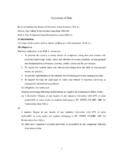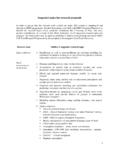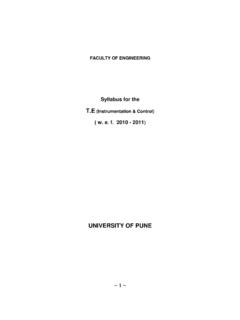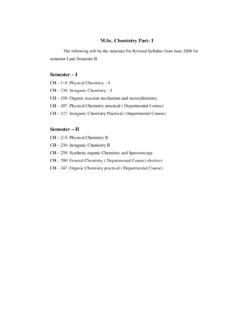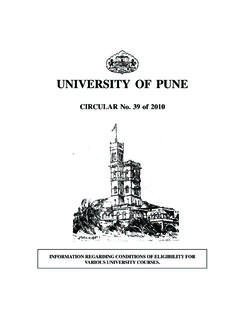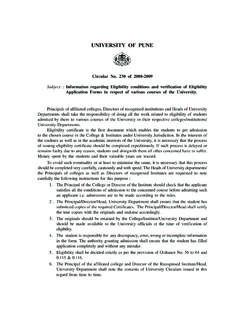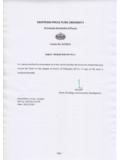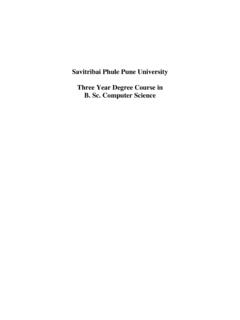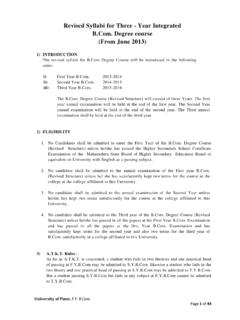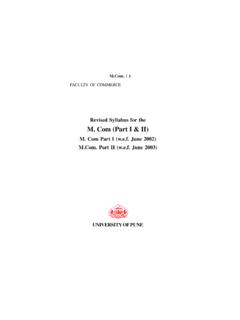Transcription of UNIVERSITY OF PUNE
1 UNIVERSITY OF pune . Political Science Credit and Semester system (CSS). Revised syllabus will be implemented with effect from the academic year 2013-2014 at College Centers Syllabus for M. A. Part I. Syllabus for Part I Semester I. List of Compulsory Courses (C= Compulsory). Paper No Papers Title PO-C1 : Political Theory PO-C2 : Public Administration PO-C3 : Political Institutions in India List of Optional Courses (O=Optional). PO-O1 : Modern Political Ideologies PO-O2 : Political Thinkers in Modern Maharashtra PO-O3 : India's Foreign Policy PO-O4 : Inequality and Exclusion 1. UNIVERSITY OF pune . Political Science Syllabus for M. A. Part I. Syllabus for Part I Semester II. List of Compulsory Courses (C= Compulsory). Paper No Papers Title PO-C4 : Public policy PO-C5 : Issues in World Politics PO-C6 : Comparative Politics List of Optional Courses (O=Optional).
2 PO-O5 : Political Process in Maharashtra PO-O6 : State Politics in India PO-O7 : Human Rights PO-O8 : Social Movement in India 2. Compulsory paper Semester I. Part -I (Political Science). 3. ---------------------------------------- ---------------------------------------- ----------------------------- Compulsory Paper Semester- I Part-I (Political Science). ---------------------------------------- ---------------------------------------- ---------------------------------- PO-C1 : Political Theory Objectives: This Course introduces Political Theory as a distinctive area of inquiry that is integral to the study of politics. It highlights contemporary normative debates and places them in a historical perspective. The Course projects the global and interdisciplinary orientation of Political Theory. It also emphasises the interplay of theory and practice in the political process.
3 1. Political Theory: Nature, Significance and Resurgence. 2. Contemporary Perspectives: Liberal, Marxist, Feminist and Communitarian. 3. State and Citizen: Political Obligation, Resistance and Civil Disobedience. 4. Key Concepts I: Liberty, Equality and Fraternity. 5. Key Concepts II: Justice, Rights and Duties. 6. Theories of Democracy: Liberal, Radical and Cosmopolitan. Readings: 1. Bhargava Rajeev and Ashok Acharya (eds.), 2008/2011, Political Theory/ Rajakiya Siddhanta (Marathi translation), Delhi, Pearson 2. Goodwin Barbara, 2004, Using Political Ideas, Chichester, John Wiley & Sons. 4. Hampton Jean, 1998, Political Philosophy, New Delhi, Oxford UNIVERSITY Press. 5. Kulkarni Mangesh (ed.), 2011, Interdisciplinary Perspectives in Political Theory, New Delhi/Thousand Oaks, Sage 6. Kymlicka Will, 2002, Contemporary Political Philosophy, Oxford, Oxford UNIVERSITY Press.
4 7. Knowles Dudley, 2001, Political Philosophy, London, Routledge 8. Pierson Christopher, 2004, The Modern State, London, Routledge. 9. Rege M. P., 2005, Swatantrya, Samata ani Nyaya, Mumbai, Shanta Rege. 10. Swift Adam, 2001, Political Philosophy, Cambridge, Polity. 4. ---------------------------------------- ---------------------------------------- --------------------------------- Compulsory Paper Semester- I Part-I (Political Science). ---------------------------------------- ---------------------------------------- ---------------------------------- PO-C2 : Public Administration Objectives: This course seeks to help students understand important concepts, approaches and theories of public administration. The course aims to equip students with understanding of the latest developments in the field of Public Administration.
5 The course will be useful for students who seek to understand and analyze broad transformations in the study of public administration in the course of changes in socio-economic and political life. 1. Public Administration: Nature and Scope, Private-Public Debate 2. Evolution of Public Administration: Classical, Neo-classical, New Public Administration, Development Administration. 3. Major Approaches to the Study of Public Administration: Bureaucratic Approach, Decision-Making, Systems Approach, Public Choice 4. Governance: Good Governance Practices and Reforms, Public Sector in the context of Liberalization. 5. Accountability and Control: Administrative and Financial Accountability, Civil Society and Public Administration. 6. Contemporary Public Administration: New Public Management, Ethics in Public Administration.
6 Readings: 1. Bhattacharya Mohit, 2008, New Horizons of Public Administration, New Delhi; Jawahar Publishers, 5th Edition. 2. Dhameja Alka (ed.), 2003, Contemporary Debates in Public Administration, New Delhi;. Prentice-Hall India 3. Goel , 2003, Public Administration: Theory and Practice, New Delhi; Deep and Deep Publishers. 4. Maheshwari , 2003, Administrative Theory: An Introduction, New Delhi; MacMillan 5. Medury Uma, 2010, Public Administration in the Globalization Era, New Delhi; Orient Blackswan. 6. Nicholas Henry, 2004, Public Administration and Public Affairs, New Delhi; Prentice-Hall India, 8th Edition. 5. 7. Shafritz Jay M. (ed.), 2007, Defining Public Administration, Jaipur; Rawat Publications, Indian Reprint. 8. Shafritz Jay M. and Albert C. Hyde (ed.), 1987, Classics of Public Administration, Chicago, Illinois, The Dorsey Press 6.
7 ---------------------------------------- ---------------------------------------- ---------------------------- Compulsory Paper Semester- I Part-I (Political Science). ---------------------------------------- ---------------------------------------- ---------------------------------- PO-C3 : Political Institutions in India Objectives: The course introduces the student to the leading institutions of the Indian political system and to the changing nature of these institutions. Apart from explaining the structure and functions of the main institutions the course will try to acquaint students with the idea of institutional balance of power as discussed in the Indian constitution and as developed during the functioning of Indian democracy over the past six decades. 1. Nationalist legacies a. Unity and Integrity b. Democracy c.
8 Active state 2. Federal institutions a. Strong centre' framework b. Autonomy and devolution c. Multilevel federalism 3. Executive a. President and prime minister b. Principle of collective responsibility and accountability to the legislature c. Role of governor 4. Legislature a. Composition and powers b. Norms of representation c. Legislative supremacy 5. Judiciary a. Judicial review b. Judicial interpretations of FRs and DPSPs and basic structure doctrine c. Judicial activism 6. New institutional mechanisms of governance a. Central Information Commission b. Central Vigilance Commission c. The National Human Rights Commission Readings: 1. Austin Granville,1972, The Indian Constitution: Cornerstone of a Nation, New Delhi, OUP. 7. 2. Austin Granville, 1999, Working a Democratic Constitution: The Indian Experience, New Delhi, OUP.
9 3. Basu, , 2001, Introduction to the Constitution of India, Nagpur, Wadhwa 4. Chapalgaonkar Narendra, Rajyaghatanche Ardhashatak, (Marathi), Mumbai, Mauj Prakashan. 5. Chapalgaonkar Narendra, Vidhimandale and Nyayasanstha, (Marathi), Mumbai, Mauj Prakashan. 6. Jayal Nirja Gopal and Pratap Bahnu Mehta (eds), 2010, The Oxford Companion to Politics in India, New Delhi, OUP. 7. Kashyap Subhash, 2009, Concise Encyclopedia of Indian Constitution, New Delhi, Vision Books 8. Kapur Devesh and Pratap Bhanu Mehta(eds), 2005, Public Institutions in India, New Delhi, OUP. 9. Noorani A G, 2000, (paperback), Constitutional Questions in India, New Delhi, OUP. 10. Reddy O. Chinnappa, 2010 (paperback), The Court and the Constitution of India: Summits and Shallows, New Delhi, OUP. 11. Saez Lawrence,2004, Federalism without a Centre, New Delhi, Sage 12.
10 Sathe , 2002, Judicial Activism in India , New Delhi, OUP. 13. Sathe S P, 1999, Rajyaghatanechi Pannas Varshe (Marathi), pune , Continental Prakashan. 14. Shankar B L and Valerian Rodrigues, 2011, The Indian Parliament: A Democracy at Work, New Delhi, OUP. 15. Sharma Brijkishor,2009, Introduction to the Constitution of India, New Delhi, Prentice Hall 8. Compulsory paper Semester II. Part -I (Political Science). 9. ---------------------------------------- ---------------------------------------- --------------------------------- Compulsory Paper Semester- II Part-I (Political Science). ---------------------------------------- ---------------------------------------- ---------------------------------- PO-C4 : Public policy Objectives: The purpose of this course is to provide students an understanding of the basic concepts, theories and process of public policy.
